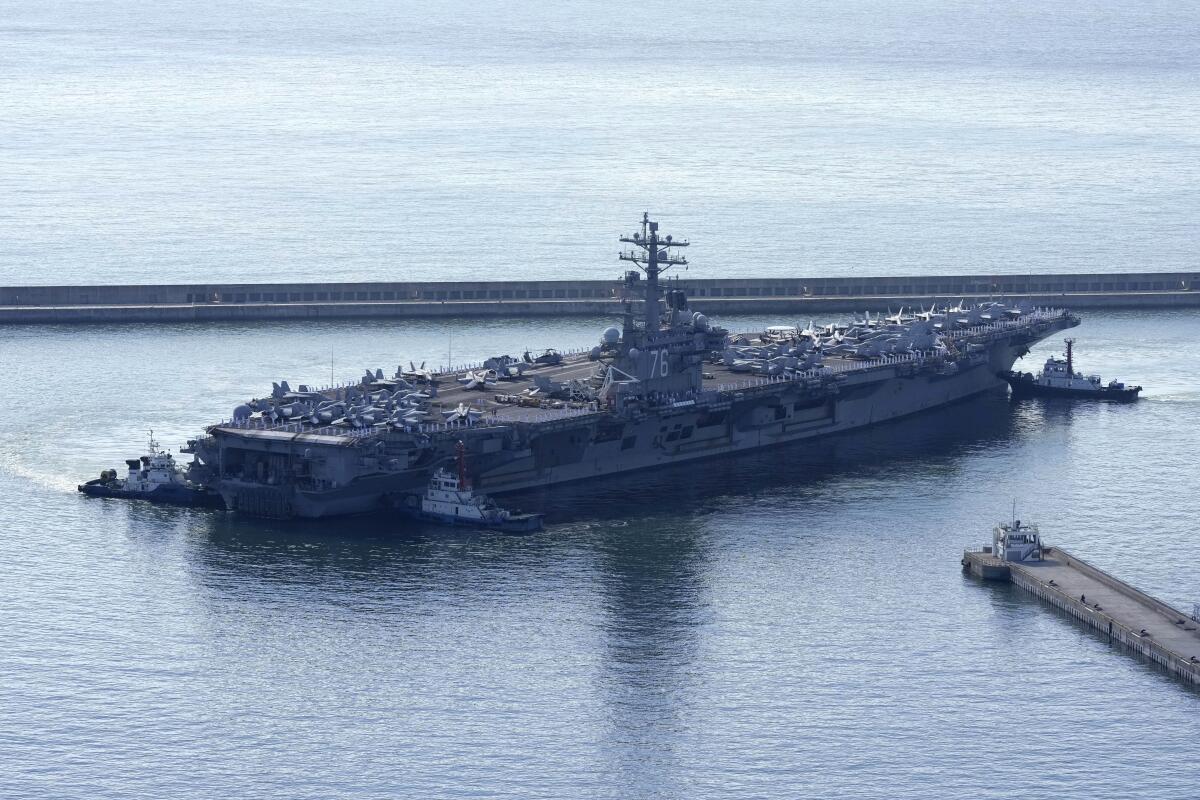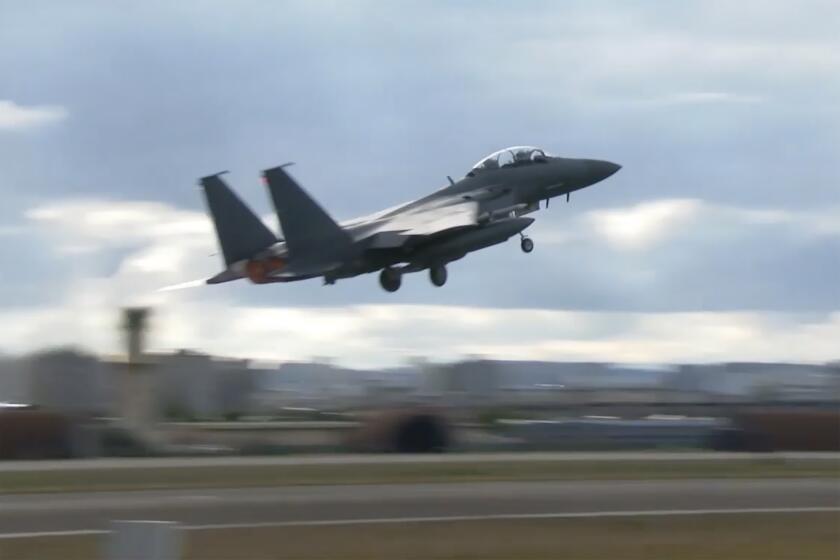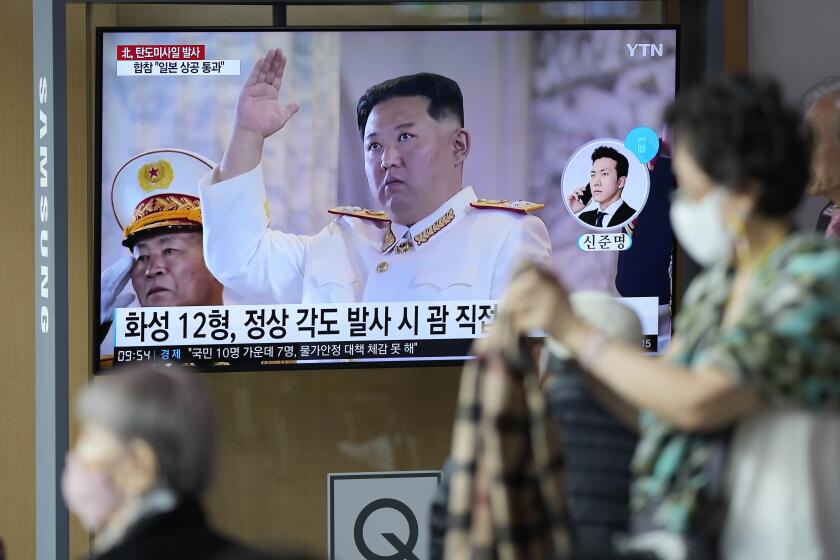North Korea launches missiles toward sea, South Korea says

- Share via
SEOUL — North Korea fired two short-range ballistic missiles toward its eastern waters on Sunday, the latest in its barrage of weapons tests in recent days,
after it warned against the U.S. redeployment of an aircraft carrier for a new round of drills with South Korean warships.
South Korea’s Joint Chiefs of Staff said in a statement that the two missiles were launched between 1:48 a.m. and 1:58 a.m. from North Korea’s eastern coastal city of Munchon.
The Joint Chiefs of Staff said South Korea’s military had boosted its surveillance posture and maintained readiness in coordination with the United States.
Japanese Vice Defense Minister Toshiro Ino also confirmed the launches, saying Pyongyang’s weapons tests were “absolutely unacceptable” because they threatened regional and
international peace and security.
Ino said the weapons could be submarine-fired ballistic missiles.
“We are continuing to analyze details of the missiles, including a possibility that they might have been launched from the sea,” Ino said.
North Korea’s pursuit of the ability to fire missiles from a submarine would constitute an alarming development for the country’s rivals, because it’s harder to detect such launches in advance. North Korea is believed to have last tested a missile launch from a submarine in May.
The South Korean and Japanese militaries assessed that the latest missiles flew about 217 miles and reached maximum altitudes of 56 to 60 miles before falling into the waters between the Korean peninsula and Japan.
Japanese Prime Minister Fumio Kishida instructed officials to gather and analyze information about the launches and to inform the public quickly, while ensuring the safety of aircraft and ships around Japan and preparing for any contingencies, according to his office.
The Japanese coast guard said it had warned ships around the country about falling objects and urged them to stay away.
The U.S. Indo-Pacific Command said in a statement that the launches didn’t pose any immediate threat to U.S. personnel or territory, or to its allies.
But it said the launches highlight “the destabilizing impact” of North Korea’s unlawful weapons of mass destruction and ballistic missile programs. It said U.S. commitments to the defense of South Korea and Japan remain “ironclad.”
The launches came hours after the United States and South Korea wrapped up a new round of naval drills off the Korean peninsula’s east coast.
South Korea says North Korea flew 12 warplanes near their mutual border on Thursday, prompting South Korea to scramble 30 military planes in response.
The drills involved the U.S. nuclear-powered aircraft carrier Ronald Reagan and its battle group, which returned to the area after North Korea fired a powerful missile over Japan last week to protest the carrier group’s previous training with South Korea.
On Saturday, North Korea’s Defense Ministry warned that the Reagan’s redeployment was causing a “considerably huge negative splash” in regional security. The Defense Ministry called its recent missile tests a “righteous reaction” to intimidating military drills between its rivals.
North Korea regards U.S.-South Korean military exercises as an invasion rehearsal and is especially sensitive if such drills involve U.S. strategic assets like an aircraft carrier. North Korea has argued it was forced to pursue a nuclear weapons program to counter U.S. nuclear threats. U.S. and South Korean officials have repeatedly said they have no intentions of attacking the North.
North Korea has fired a ballistic missile over Japan, its neighbors said, escalating tests of weapons designed to strike key targets in regional U.S. allies amid stalled nuclear diplomacy.
The latest launches added to North Korea’s record-breaking pace of weapons tests this year. The recent tests include a nuclear-capable missile that flew over Japan for the first time in five years and demonstrated a range to strike the U.S. Pacific territory of Guam and beyond.
North Korea’s testing spree indicates its leader, Kim Jong Un, has no intention of resuming diplomacy with the U.S. and wants to focus on expanding his weapons arsenal. But some experts say Kim would eventually aim to use his advanced nuclear program to wrest greater outside concessions, such as the recognition of North Korea as a legitimate nuclear state, which Kim thinks is essential to get crippling United Nations sanctions on his country lifted.
North Korea launched two ballistic missiles toward its eastern waters, as the U.S. redeployed an aircraft carrier near the Korean peninsula.
South Korean officials recently said North Korea was also prepared to test a new liquid-fueled intercontinental ballistic missile and a submarine-launched ballistic missile while maintaining readiness to perform its first underground nuclear test since 2017.
More to Read
Sign up for Essential California
The most important California stories and recommendations in your inbox every morning.
You may occasionally receive promotional content from the Los Angeles Times.













